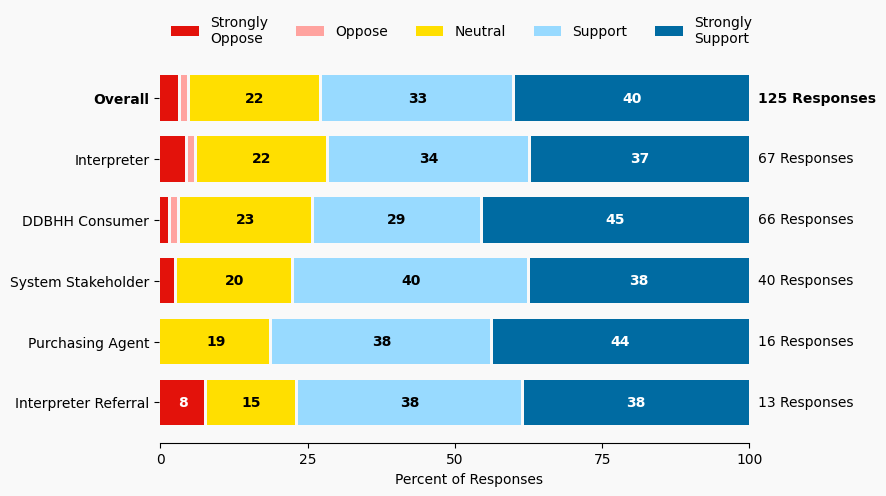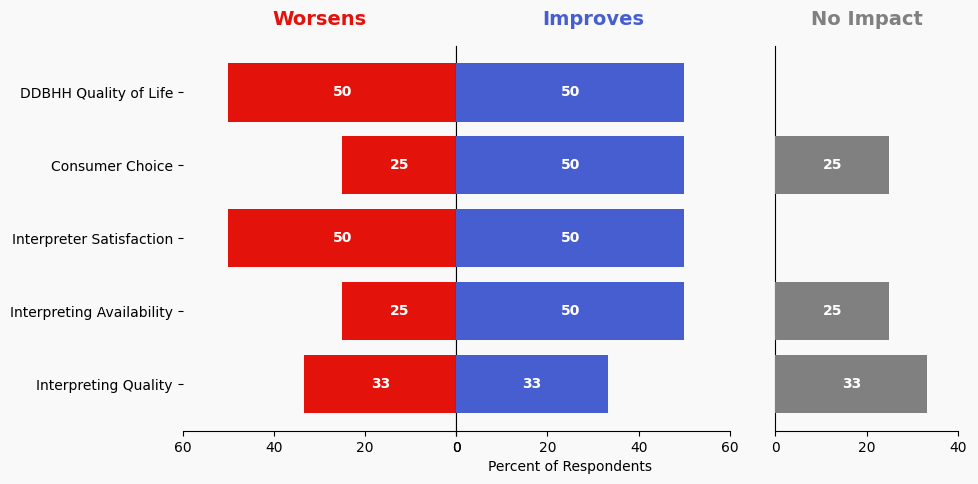34 Lobby for Additional Funding to Strengthen Disabled-owned and BIPOC Interpreter Referral Companies
Issue: There are few successful BIPOC or DDBHH-owned (aka Disabled-owned) interpreter referral companies. While there is not any support for a start-up or ongoing interpreting referral company owner, BIPOC and DDBHH persons often experience greater inequities.
Proposed Solution: Commission lobby with relevant state agencies (DEED VRS, State Services) to receive funding for business owners to support the start up and ongoing success of BIPOC and DDBHH owned interpreter referral companies.
Expected outcome: Interpreter referral companies owned and operated by DDBHH persons are likely to have the consumer experience embedded into its policies and practices. Interpreter referral companies owned and operated by DDBHH BIPOC are likely to be more sensitive to issues significant to BIPOC consumers and interpreters.
Who is impacted: Interpreter referral company owners who are DDBHH and/or BIPOC.
Timeline: 6 months

Summary of Support Image Description
The stacked bar charts show how respondents rated their level of support and the total number of responses. The percentage for the five support levels is shown from left to right: Strongly Oppose (Dark Red), Oppose (Light Red), Neutral (Yellow), Support (Light Blue), and Strongly Support (Dark Blue).
Respondents may identify with multiple subgroups. The overall level of support is:
Overall
Strongly Oppose: 3%
Oppose: 2%
Neutral: 22%
Support: 33%
Strongly Support: 40%
Click to see the detailed image description for each subgroup.
Interpreter
Strongly Oppose: 4%
Oppose: 1%
Neutral: 22%
Support: 34%
Strongly Support: 37%
Interpreter Referral
Strongly Oppose: 8%
Oppose: 0%
Neutral: 15%
Support: 38%
Strongly Support: 38%
DDBHH Consumer
Strongly Oppose: 2%
Oppose: 2%
Neutral: 23%
Support: 28%
Strongly Support: 45%
Purchasing Agent
Strongly Oppose: 0%
Oppose: 0%
Neutral: 19%
Support: 38%
Strongly Support: 44%
System Stakeholder
Strongly Oppose: 2%
Oppose: 0%
Neutral: 20%
Support: 40%
Strongly Support: 38%
Overview of Respondents Opting for In-Depth Solution Analysis
After indicating their support level, 2% of the 125 respondents opted in to further assess whether the solution would worsen or improve on five metrics. Of the opt-in reviewers (3 respondents), 33% supported the solution, 0% were neutral on the solution, and 66% opposed the solution.
The remaining 122 respondents did not opt in to further assess the solution. Of these people, 73% support the solution, 22% were neutral on the solution, and 3% opposed the solution.
Reviewer Evaluation of Solution Effectiveness

Solution Effectiveness Image Description
The stacked bar charts show how respondents assessed the effectiveness of this solution based on five metrics. For each metric, the percentage of respondents is shown from left to right: Worsens (Red), Improves (Blue), No Impact (Gray).
DDBHH Quality of Life
Makes It Worse 50%
Makes It Better 50%
No Impact 0%
Interpreter Satisfaction
Makes It Worse 50%
Makes It Better 50%
No Impact 0%
Consumer Choice
Makes It Worse 25%
Makes It Better 50%
No Impact 25%
Interpreting Availability
Makes It Worse 25%
Makes It Better 50%
No Impact 25%
Interpreting Quality
Makes It Worse 33%
Makes It Better 33%
No Impact 33%
Reviewer Feedback and Insights
Interpreter
Comments from Interpreters express strong support for increasing funding for disabled and neurodivergent-owned referral companies, with concerns about ensuring that the funding is used effectively. Suggestions include creating a system for tracking how the funding is used and ensuring that it supports the development of these companies.
Deaf, DeafBlind, Hard of Hearing
Comments from DDBHH Consumers suggest that increasing funding for disabled and neurodivergent-owned referral companies could help improve access to interpreting services. Concerns include ensuring that the funding is used to support inclusivity and accessibility. Suggestions include creating a system for ensuring that the companies provide high-quality services.
System Stakeholder
Comments from System stakeholders suggest that increasing funding for disabled and neurodivergent-owned referral companies could help improve the quality of interpreting services. Suggestions include creating a system for ensuring that the funding is used effectively and supports the development of these companies. Concerns include ensuring that the companies prioritize inclusivity and accessibility.
PREVIOUS SOLUTION
33 Legislate Requiring Consumer Grievance Process for Referral Companies
Issue: DDBHH consumers often feel that concerns or complaints about interpreters are not addressed.
NEXT SOLUTION
35 Accredit Interpreter Referral Companies
Issue: Multiple concerns have been raised about interpreter referral company practices. There is no standardization of interpreter referral companies nationwide nor statewide. While RID and NAD have each discussed and held groups to work on developing standards, such as a Code of Professional Conduct, Better Business Bureau ratings or similar system for providing guidance to interpreter referral companies, no such systems or guidance exist.
Leave a Reply